Coffee is one of the most widely consumed beverages in the world, and for a good reason. It provides an instant energy boost and has numerous health benefits, such as reducing the risk of type 2 diabetes and Alzheimer’s disease. However, not all coffee makers are created equal.
Traditional coffee makers can contain toxic materials that can be harmful to health. This is where non-toxic coffee makers come in.
Choosing a non-toxic coffee maker is an important consideration for health-conscious consumers who are looking to reduce their exposure to harmful chemicals.
Traditional coffee makers can contain materials like plastic, aluminum, and even lead, which can leach into the coffee during brewing. This can lead to various health problems, including headaches, nausea, and long-term health issues like cancer.
Non-toxic coffee makers are designed to be free from harmful chemicals, ensuring that the coffee is not contaminated and remains safe for consumption.
In this article, we will explore the importance of choosing a non-toxic coffee maker, the dangers of toxic coffee makers, and the features to look for in non-toxic coffee makers.
We will also highlight some of the top non-toxic coffee maker brands on the market and provide tips on cleaning and maintaining a non-toxic coffee maker.
What Makes a Coffee Maker Toxic?
Coffee makers have become an essential part of our daily routines. However, not all coffee makers are made equal, and some can actually be harmful to our health.
Traditional coffee makers can contain materials that can leach toxic chemicals into the coffee during brewing, posing a severe health risk over time.
One of the most common materials used in traditional coffee makers is plastic. Plastic can contain harmful materials such as Bisphenol A (BPA), which has been linked to numerous health issues such as cancer, obesity, and hormonal imbalances.
Other traditional coffee makers’ materials, such as aluminum and non-stick coatings, can also be toxic, especially if they are scratched or damaged.
During the brewing process, traditional coffee makers can also release harmful chemicals such as acrylamide and polycyclic aromatic hydrocarbons (PAHs).
These chemicals are formed when coffee beans are roasted at high temperatures and can harm human health when consumed in large amounts.
To combat these health risks, non-toxic coffee makers are made with materials that are safe for consumption. Glass, stainless steel, and BPA-free plastics are commonly used in non-toxic coffee makers to ensure no harmful chemicals leach into the coffee.
Non-toxic coffee makers are also designed to prevent the release of harmful chemicals during the brewing process.
Choosing a non-toxic coffee maker is a safer alternative that can help protect our health in the long run. By understanding the differences between traditional and non-toxic coffee makers, consumers can make informed decisions about the products they use daily.
Importance of Non-Toxic Coffee Makers
Non-toxic coffee makers have become increasingly popular among health-conscious consumers, and for a good reason. By choosing a non-toxic coffee maker, you can reduce exposure to harmful chemicals and ensure your coffee is safe for consumption.
Here are some of the key reasons why non-toxic coffee makers are important:
1. Protecting your health:
Traditional coffee makers can contain toxic materials like plastic, aluminum, and non-stick coatings that can be harmful to your health. By choosing a non-toxic coffee maker, you can reduce your exposure to these chemicals and protect your health in the long run.
2. Reducing environmental impact:
Non-toxic coffee makers are often made from eco-friendly materials like glass and stainless steel, which are recyclable and have a lower impact on the environment than traditional coffee makers.
3. Better taste:
Traditional coffee makers can leave a plastic or metallic taste in your coffee due to the materials used in their construction. Non-toxic coffee makers, on the other hand, are designed to maintain the pure taste of the coffee without any unwanted flavors.
4. Cost-effective:
While non-toxic coffee makers may initially cost more than traditional coffee makers, they are often more durable and can last for many years. This means that you will not need to replace your coffee maker as frequently, saving you money in the long run.
The Health Risks of Traditional Coffee Makers
Traditional coffee makers are a staple in many households, but they can pose significant health risks if made with toxic materials or chemicals.
Traditional coffee makers can be made with materials that can leach toxic chemicals into your coffee. For example, plastic coffee makers may contain Bisphenol A (BPA), which is linked to severe health problems like cancer, hormonal imbalances, and obesity.
Additionally, traditional coffee makers may contain aluminum or non-stick coatings that can release toxic chemicals if scratched or damaged.
These toxic chemicals can enter your coffee during the brewing process and have a negative impact on your health.
For example, acrylamide and polycyclic aromatic hydrocarbons (PAHs) can form during roasting and may be present in your coffee using a traditional coffee maker. These chemicals have been linked to health problems like cancer and neurological damage.
Non-toxic coffee makers, on the other hand, are designed to minimize your exposure to these harmful chemicals. They are often made with materials like glass, stainless steel, and BPA-free plastic, which do not contain toxic chemicals that can leach into your coffee.
Non-toxic coffee makers also have specialized filters and brewing methods that reduce the presence of acrylamide and PAHs in your coffee.
Materials That Make Coffee Makers Toxic
Coffee makers are essential for many households, but they can be made with materials that can harm your health.
One of the most common materials used in coffee makers is plastic, which can contain Bisphenol A (BPA) and other harmful chemicals. BPA has been linked to severe health problems like cancer, hormonal imbalances, and obesity.
Additionally, plastic can release toxic chemicals if scratched or damaged, entering your coffee and impacting your health.
Another material used in coffee makers is aluminum, which can also be harmful if it leaches into your coffee. Aluminum can react with acidic substances like coffee, releasing toxic chemicals that can cause health problems like Alzheimer’s disease.
Non-stick coatings like Teflon are also commonly used in coffee makers, but they can release toxic chemicals if scratched or heated to high temperatures. These chemicals can enter your coffee and have adverse effects on your health.
During brewing, chemicals like acrylamide and polycyclic aromatic hydrocarbons (PAHs) can also form and may be present in your coffee. These chemicals have been linked to health problems like cancer and neurological damage.
Additionally, choosing a coffee maker with specialized filters and brewing methods that reduce the presence of acrylamide and PAHs in your coffee can further protect your health.
Factors to Consider While Choosing a Non-Toxic Coffee Maker
Choosing a non-toxic coffee maker is an important decision for health-conscious consumers.
Here are the factors to consider while selecting a non-toxic coffee maker:
Materials:
The materials used in the coffee maker are a crucial factor to consider. It is best to choose coffee makers made of materials that do not contain harmful chemicals like BPA, phthalates, or lead.
Glass, stainless steel, and BPA-free plastic are excellent choices for non-toxic coffee makers. These materials are durable, easy to clean, and do not leach toxins into your coffee.
Brewing Method:
The brewing method is another important factor to consider. Some brewing methods like drip coffee makers, espresso machines, and percolators can produce toxic compounds like acrylamide and polycyclic aromatic hydrocarbons (PAHs) in your coffee.
French presses and pour-over coffee makers are safer options as they do not produce as many toxic compounds.
Filters:
Coffee filters are an essential part of the brewing process. Some coffee filters are made of paper, which can contain bleach or other harmful chemicals. Choosing unbleached paper filters or reusable metal filters is best to minimize exposure to harmful chemicals.
Brand Reputation:
Choosing a reputable brand can ensure you get a non-toxic coffee maker. Look for brands that are transparent about their materials and manufacturing processes.
Reading reviews and researching the brand’s history can also give you a better understanding of the quality and safety of its products.
Ease of Use:
The ease of use is also a factor to consider. A non-toxic coffee maker should be easy to clean and maintain.
A coffee maker with complicated parts or difficult cleaning requirements may discourage you from using it regularly, making it less convenient and less effective at reducing exposure to harmful toxins.
Price:
Price is always a factor to consider when making a purchase. Non-toxic coffee makers can be more expensive than traditional coffee makers due to their materials and manufacturing processes.
However, investing in a non-toxic coffee maker can be worth it in the long run as it can provide a healthier and safer cup of coffee.
Why BPA-Free Components in Coffee Makers are Importance?
BPA or Bisphenol A is a synthetic compound commonly used in manufacturing plastics, including coffee makers. However, BPA has been linked to numerous health concerns, including hormonal imbalances, developmental issues, and even cancer.
As a result, many health-conscious consumers are looking for coffee makers with BPA-free components.
The benefits of BPA-free components in coffee makers are numerous. Firstly, it ensures no risk of BPA leaching into your coffee, which can harm your health. Additionally, BPA-free components are more durable and long-lasting than their BPA-containing counterparts.
Coffee makers with BPA-free components are becoming increasingly popular. Many manufacturers now produce coffee makers with BPA-free plastic, glass, and stainless-steel components.
These coffee makers are often more expensive than traditional ones, but the health benefits are worth the investment.
In comparison, coffee makers with BPA-containing components can harm your health. Studies have shown that exposure to BPA can cause hormonal imbalances, especially in women. It has also been linked to developmental issues in children and an increased risk of cancer.
If you are looking for a BPA-free coffee maker, several options are available in the market. French presses, pour-over coffee makers, and percolators are excellent choices as they do not require plastic components.
Additionally, some brands now offer BPA-free plastic and stainless-steel components in their coffee makers.
Top 5 Non-Toxic Coffee Makers
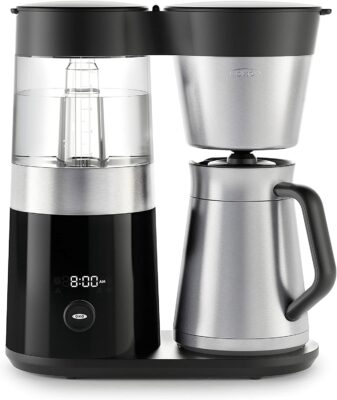
OXO Brew Stainless Steel Coffee Maker
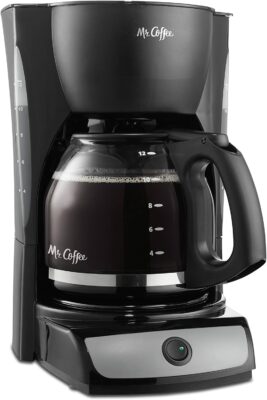
Mr. Coffee Switch Coffeemaker
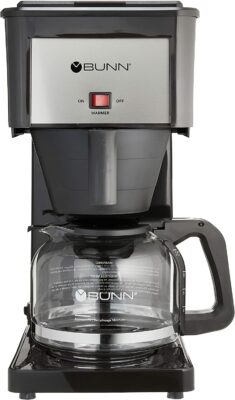
BUNN GRB Velocity Brew Home Coffee Brewer
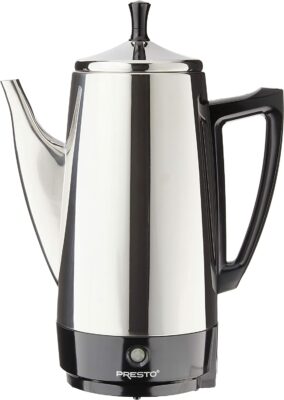
Presto 02811 Stainless Steel Coffee Maker
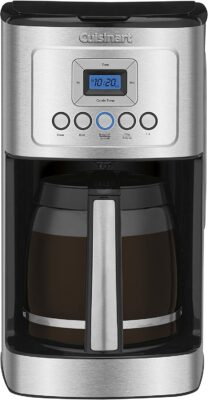
Cuisinart DCC-3200P1 Coffee Maker
Maintenance and Cleaning Tips for Non-Toxic Coffee Makers
Coffee makers are a staple in many households, providing a daily dose of caffeine to kickstart the day. To ensure that your coffee is safe and non-toxic, it’s important to choose a coffee maker that is made with safe, eco-friendly materials.
In addition, proper maintenance and cleaning of your coffee maker are essential to prevent the buildup of mold and bacteria that can negatively impact the flavor of your coffee and even your health.
Proper Cleaning and Maintenance
First and foremost, always refer to the manufacturer’s instructions for cleaning and maintenance. Follow their guidelines for cleaning frequency and any specific instructions for your particular model.
Here are some general tips to keep in mind:
1. Regular cleaning:
Ideally, your coffee maker should be cleaned after every use. At the very least, it should be cleaned weekly to prevent mold and bacteria buildup. This includes cleaning the carafe, filter basket, and other removable parts.
2. Use vinegar:
Vinegar is a natural and effective way to clean and descale your coffee maker. Simply mix equal parts of white vinegar and water and run it through the coffee maker as you would when making coffee. Follow up with a couple of clean water cycles to rinse any residual vinegar.
3. Avoid using harsh chemicals:
Avoid harsh chemicals like bleach or abrasive cleaners, as they can damage the coffee maker and potentially leave harmful residues.
Tips for Avoiding Mold and Bacteria Buildup
Mold and bacteria can thrive in warm, damp environments, making your coffee maker a prime breeding ground if not properly maintained.
Here are some tips to prevent mold and bacteria buildup:
- Don’t leave water sitting in the reservoir: Empty the reservoir and the carafe after every use to prevent water from stagnating in the coffee maker.
- Dry the coffee maker thoroughly: After cleaning, make sure to dry the coffee maker completely to prevent any moisture from remaining.
- Store the coffee maker in a dry place: When not in use, store your coffee maker in a dry place to prevent any moisture from accumulating.
Common Mistakes to Avoid
Finally, here are some common mistakes to avoid when cleaning your coffee maker:
- Forgetting to clean the carafe: The carafe is a common breeding ground for mold and bacteria. Make sure to clean it thoroughly after every use.
- Neglecting the filter basket: The filter basket can also accumulate mold and bacteria if not cleaned regularly. Make sure to remove and clean it after every use.
- Not descaling regularly: Mineral buildup can affect the performance of your coffee maker and affect the flavor of your coffee. Make sure to descale your coffee maker regularly as per the manufacturer’s instructions.
By following these tips and guidelines, you can enjoy your morning cup of coffee with peace of mind, knowing that it is made with safe, eco-friendly materials and free from harmful contaminants.
FAQs
Conclusion
To recap, it’s essential to choose a non-toxic coffee maker because traditional coffee makers can release harmful chemicals and toxins into your coffee, affecting your health and well-being. The materials used to manufacture non-toxic coffee makers are environmentally friendly and free of toxic chemicals.
Investing in a non-toxic coffee maker is a smart choice for any coffee lover who values health and the environment. You can enjoy a delicious and healthy cup of coffee every day by selecting a coffee maker made of safe materials and free of toxic chemicals.
Take the time to research and choose the best non-toxic coffee maker that suits your needs, and start enjoying the benefits today!
